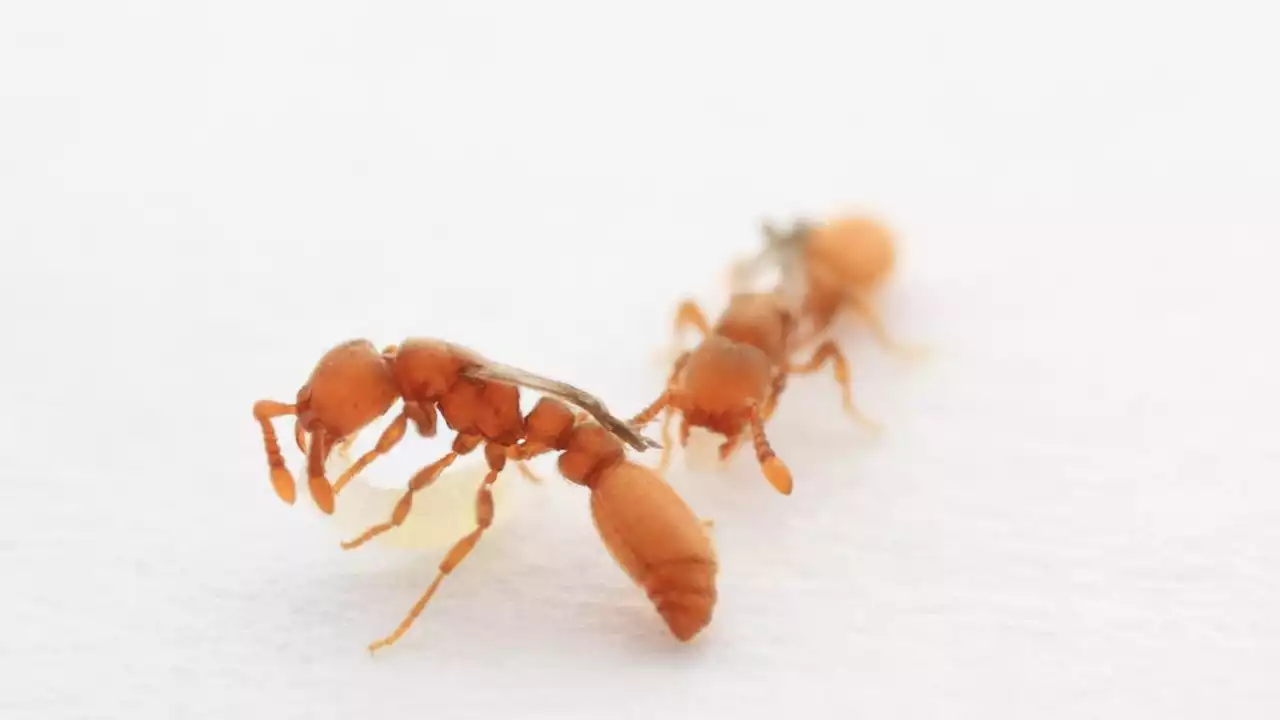Sascha is a U.K.-based trainee staff writer at Live Science. She holds a bachelor’s degree in biology from the University of Southampton in England and a master’s degree in science communication from Imperial College London. Her work has appeared in The Guardian and the health website Zoe. Besides writing, she enjoys playing tennis, bread-making and browsing second-hand shops for hidden gems.
About a decade ago, scientists observing clonal raider ants spotted something strange: Although the species is known to be queenless, a few ants were posing as queens of the colony, lording over their hardworking counterparts. These wannabe queens had wing stubs, as well as giant eyes and ovaries.
"This was a shocking discovery," Waring"Buck" Trible , an entomologist, John Harvard Distinguished Science Fellow and the lead author of the study in which the findings were published, told Live Science in an email."The clonal raider ant is a queenless ant species, and no winged female adults have been observed in this species previously."
This single mutation may be the switch that turned clonal raider ants from the"wild type" usually found in nature into a mutant variant of the same species. "What we describe here is a mutant strain that is extremely closely related to its wild type ancestors. So it's not really a different species, but maybe what could be considered an intermediate form," Kronauer added.
United States Latest News, United States Headlines
Similar News:You can also read news stories similar to this one that we have collected from other news sources.
 Shockwaves rocking the 'cosmic web' connecting galaxies seen for the 1st timeRobert Lea is a science journalist in the U.K. whose articles have been published in Physics World, New Scientist, Astronomy Magazine, All About Space, Newsweek and ZME Science. He also writes about science communication for Elsevier and the European Journal of Physics. Rob holds a bachelor of science degree in physics and astronomy from the U.K.’s Open University. Follow him on Twitter sciencef1rst.
Shockwaves rocking the 'cosmic web' connecting galaxies seen for the 1st timeRobert Lea is a science journalist in the U.K. whose articles have been published in Physics World, New Scientist, Astronomy Magazine, All About Space, Newsweek and ZME Science. He also writes about science communication for Elsevier and the European Journal of Physics. Rob holds a bachelor of science degree in physics and astronomy from the U.K.’s Open University. Follow him on Twitter sciencef1rst.
Read more »
 'Missing link' protostar may prove solar system's water is older than the sunRobert Lea is a science journalist in the U.K. whose articles have been published in Physics World, New Scientist, Astronomy Magazine, All About Space, Newsweek and ZME Science. He also writes about science communication for Elsevier and the European Journal of Physics. Rob holds a bachelor of science degree in physics and astronomy from the U.K.’s Open University. Follow him on Twitter sciencef1rst.
'Missing link' protostar may prove solar system's water is older than the sunRobert Lea is a science journalist in the U.K. whose articles have been published in Physics World, New Scientist, Astronomy Magazine, All About Space, Newsweek and ZME Science. He also writes about science communication for Elsevier and the European Journal of Physics. Rob holds a bachelor of science degree in physics and astronomy from the U.K.’s Open University. Follow him on Twitter sciencef1rst.
Read more »
 Antarctic sea ice hits record low, satellites revealTereza is a London-based science and technology journalist, aspiring fiction writer and amateur gymnast. Originally from Prague, the Czech Republic, she spent the first seven years of her career working as a reporter, script-writer and presenter for various TV programmes of the Czech Public Service Television. She later took a career break to pursue further education and added a Master's in Science from the International Space University, France, to her Bachelor's in Journalism and Master's in Cultural Anthropology from Prague's Charles University. She worked as a reporter at the Engineering and Technology magazine, freelanced for a range of publications including Live Science, Space.com, Professional Engineering, Via Satellite and Space News and served as a maternity cover science editor at the European Space Agency.
Antarctic sea ice hits record low, satellites revealTereza is a London-based science and technology journalist, aspiring fiction writer and amateur gymnast. Originally from Prague, the Czech Republic, she spent the first seven years of her career working as a reporter, script-writer and presenter for various TV programmes of the Czech Public Service Television. She later took a career break to pursue further education and added a Master's in Science from the International Space University, France, to her Bachelor's in Journalism and Master's in Cultural Anthropology from Prague's Charles University. She worked as a reporter at the Engineering and Technology magazine, freelanced for a range of publications including Live Science, Space.com, Professional Engineering, Via Satellite and Space News and served as a maternity cover science editor at the European Space Agency.
Read more »
 Celebrate women in science — today, and every dayInternational Women’s Day can serve to bring hope, highlight progress, and inspire research communities to continue their efforts to push hard for true gender quality.
Celebrate women in science — today, and every dayInternational Women’s Day can serve to bring hope, highlight progress, and inspire research communities to continue their efforts to push hard for true gender quality.
Read more »
 Ocean-drilling ship that revolutionized Earth science due to retireThe US National Science Foundation has announced that it will retire its flagship ocean drilling research vessel rather than extend its operation, as many researchers had hoped. It blamed the US$72 million annual expense of running the 44-year-old vessel
Ocean-drilling ship that revolutionized Earth science due to retireThe US National Science Foundation has announced that it will retire its flagship ocean drilling research vessel rather than extend its operation, as many researchers had hoped. It blamed the US$72 million annual expense of running the 44-year-old vessel
Read more »
 Former NYT science editor slams Fauci for discrediting lab leak theoryA former New York Times science editor ripped Dr. Anthony Fauci Wednesday for repeatedly seeking to discredit the so-called “lab leak theory” of COVID-19’s origin — just days afte…
Former NYT science editor slams Fauci for discrediting lab leak theoryA former New York Times science editor ripped Dr. Anthony Fauci Wednesday for repeatedly seeking to discredit the so-called “lab leak theory” of COVID-19’s origin — just days afte…
Read more »
